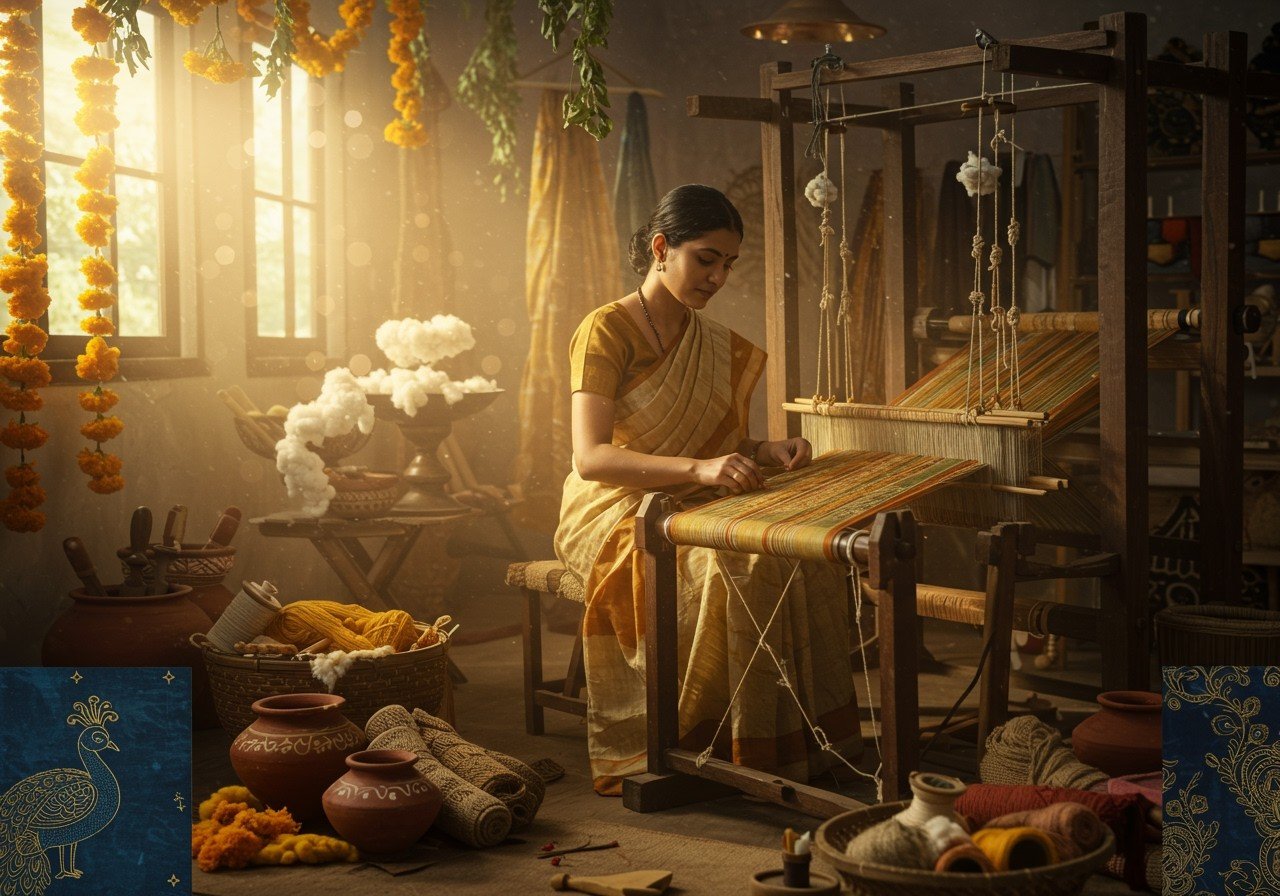The Significance of Sustainable Practices in the Indian Textile Industry

The textile industry in India holds a prominent position in both the cultural and economic landscape, deeply woven into tradition while adapting to contemporary needs. With increasing environmental consciousness, sustainable textiles have become essential. This article explores how sustainable practices are being integrated into the textile industry, emphasizing eco-friendly materials, technical innovations, and recycling. At poojn.in, we understand the importance of sustainable practices, offering a variety of products that align with these values. Explore our collection of natural dyes and materials, handwoven cotton items, and other eco-conscious choices.
Understanding Eco-Conscious Textiles
Sustainable textiles, also known as eco-friendly or green textiles, are produced with minimal environmental harm. They utilize environmentally responsible materials and processes to diminish carbon emissions and conserve resources. Key certifications to look for include GOTS (Global Organic Textile Standard) and OEKO-TEX, ensuring textiles adhere to rigorous environmental and social criteria. Organic fibers, such as organic cotton and hemp, are fundamental to sustainable textile manufacturing, grown without harmful chemicals, making them environmentally beneficial. Innovations such as waterless dyeing and biodegradable fabrics are propelling the industry toward its sustainability objectives, offering environmental protection and fresh prospects for textile manufacturers.
Technical Textiles: Functionality and Sustainability
The technical textile sector prioritizes functionality over aesthetics. India is a frontrunner in this domain, supporting sectors like agriculture, healthcare, and infrastructure with government support through initiatives like the National Technical Textiles Mission. Technical textiles boost sustainability—geotextiles aid erosion control, while healthcare textiles reduce medical waste. However, challenges persist, including high production expenses and a shortage of skilled labor.
Textile Recycling: A Circular Approach
Textile recycling converts waste into reusable materials, minimizing landfill waste and preserving resources. Recycling in India is expanding with growing awareness and support, encompassing post-consumer waste and industrial scraps. Advanced technologies like chemical recycling enhance efficiency, and upcycling gives products new life. Challenges remain in waste collection and contamination issues. Poojn.in supports these efforts by offering products made with recycled and upcycled materials. Discover our selection of sustainable products today.
Cultural Significance and Evolving Consumer Preferences
Textiles possess profound cultural meaning in India, with fabrics like silk and cotton highly valued. Sustainable practices resonate with cultural values of resource conservation and environmental respect. Consumers are increasingly opting for environmentally friendly textiles, with online platforms simplifying access and convenience. Transparency fosters trust, and narratives about textile origins facilitate informed decisions. Celebrity endorsements and social media also contribute to their rising popularity. Visit poojn.in to discover a wide selection of sustainable products.
Challenges and Opportunities in Sustainable Textiles
Embracing sustainable practices presents challenges for the textile industry, including high costs and intricate supply chains. However, opportunities abound, driven by innovation and consumer demand. Collaboration between government, industry, and NGOs fosters sustainability, while education and training cultivate a skilled workforce. Policy backing accelerates the shift towards sustainable textiles.
Sustainable Textile Options: Your Questions Answered
What is the textile industry? The textile industry encompasses the production and manufacture of fabrics, yarns, and fibers, involving processes like weaving, knitting, and dyeing.
Why are sustainable practices crucial in the textile industry? Sustainable practices lessen the environmental impact of textile production, promoting eco-conscious materials and processes that conserve resources and curtail pollution.
How can textiles be eco-friendly? Textiles achieve eco-friendliness through the use of organic materials, recycling existing fabrics, and adopting energy-efficient manufacturing methods. These methods minimize waste and reduce carbon footprints. Poojn.in offers a curated selection of eco-friendly textiles for various needs.
What constitutes the textile recycling industry in India? The Indian textile recycling industry concentrates on reusing and repurposing used fabrics, lessening textile waste by transforming discarded clothes and materials into new products.
Do technical textiles align with sustainable practices? Indeed, technical textiles can be integral to sustainable practices. They often utilize innovative materials and techniques to improve durability and function, minimizing frequent replacements. Poojn.in offers a variety of technical textiles that support sustainable practices.
What role does the technical textile industry play in India? The Indian technical textile industry is vital for producing high-performance textiles with specialized functions for sectors like healthcare, agriculture, and defense. Browse our collection of technical textiles at Poojn.in.
How can consumers support sustainable textile practices? Consumers can contribute by selecting eco-conscious brands, recycling used garments, and patronizing businesses that prioritize sustainable manufacturing. Discover a wide range of sustainable products at Poojn.in.
Towards a Sustainable Textile Future
India’s journey toward a sustainable textile industry holds both challenges and promise. Combining technical innovation with cultural heritage, India leads in eco-conscious practices. Supportive government initiatives and rising consumer awareness pave the way for a greener future. Obstacles like high costs and skill deficits exist but offer growth and innovation opportunities. By embracing sustainability, the textile industry honors tradition and ensures a prosperous future. Choosing eco-friendly textiles as consumers supports this endeavor, guaranteeing the vibrant heritage of Indian textiles continues to flourish ethically and responsibly. Explore Poojn.in’s diverse range of sustainable textiles and join us in supporting a greener future.


